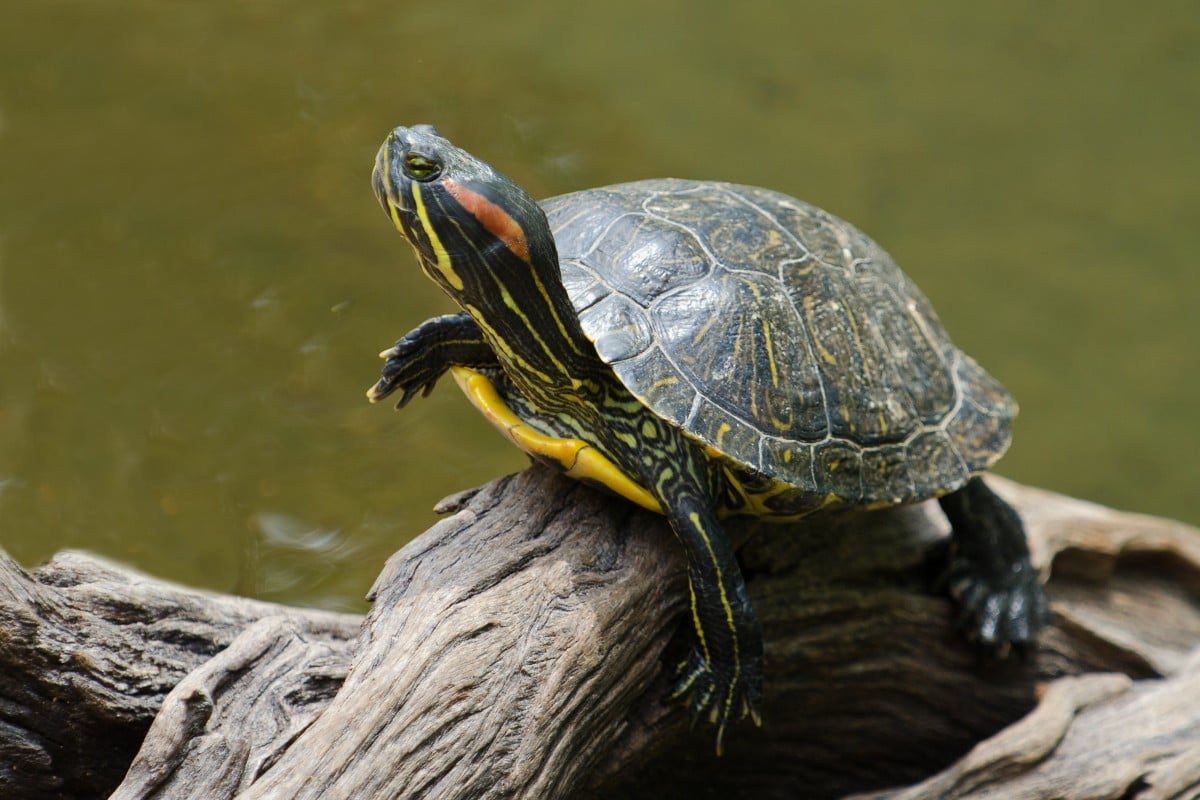
- An expert explains how to care for your reptile while looking out for signs of illness that may affect their quality of life or make them sick
- Eating gravel and yawning are actually quite dangerous behaviours to watch out for
 Red-eared sliders are reptiles who love basking in the warmth of the sun or a lamp
Red-eared sliders are reptiles who love basking in the warmth of the sun or a lampHave you ever looked at your pet and thought, “Just what is going on in that brain of yours?” Well, Young Post has been getting the pawriffic low-down from vets and other animal experts to help you interpret your companion’s behaviour and what it could be thinking.
This week, we’ll learn about red-eared sliders, one of the most common pet reptiles in Hong Kong’s Goldfish Market. Unlike tortoises which spend most of their time on land, and turtles which live in water, red-eared sliders are semi-aquatic reptiles that enjoy the best of both worlds.
Find out if our half-shell friends are asking to play when they flutter their claws, and whether they’re secretly levelling up their ninjitsu when they dig at their basking platform.
From burrowing to stretching, here’s what your hamster’s behaviour means
Eating gravel
This could be a sign that your slider is bored. Eating gravel can cause serious health issues, and for this reason, they should be kept in tanks without gravel at the bottom. Since red-eared sliders spend most of their time in the tank, you can help them stay curious and active by giving them larger rocks, hiding areas, or ornaments to explore.
Hissing
Although red-eared sliders don’t have any vocal cords, they do hiss and huff when they are angry or upset. This often happens if you try to pick it up suddenly or if they are trying to escape from danger.
Sometimes, you may hear this hissing when they are startled while basking. This is usually followed by a loud splash as they make a quick getaway into the water. If you were trying to pet your slider, you should probably give it some space and leave it alone for the time being.
Exotic pets guide: How to take care of reptiles such as turtles and lizards
Shaking its arms
This is their mating dance. A male red-eared slider shakes his front feet when he is ready to mate. He will swim in front of the female, move his front legs in front of her face, and gently wiggle his claws in front of her nose. And if the female slider likes his courtship dance, she will usually respond by dropping to the bottom of the tank.
If your slider hisses at you when you try to pick it up, that's a sign that you should leave it alone for a while
Yawning or wheezing
While this behaviour may just seem to show that your scaly critter is tired or bored, it is actually more serious than it looks.
Red-eared sliders are prone to pneumonia and different respiratory diseases, and difficulty in breathing is one of the major symptoms. If your slider is spending more time on the basking platform and seems to be yawning, sneezing, wheezing, or having a nasal discharge, it’s best to bring them to a vet as soon as possible.
Basking for a really long time
In the wild, these reptiles live in large ponds with plenty of access to sites where they can bask in the sunlight. Pet red-eared sliders need a large area to swim and access to a warm basking platform with heat and ultraviolet B lighting. While they spend between two and eight hours basking every day, they might avoid dipping their claws in the water if it’s too cold: 23 to 29 degrees Celsius is usually the sweet spot.
Do watch out if they swim less often, and bask more than usual. It could mean they are sick, and are trying to increase their temperature to stimulate their immune system. When this happens, it’s time for a visit to the vet.
Hong Kong animal concern groups beg people to stop the ‘mercy release’ of turtles
Digging at basking platform
If your female slider is actively digging at the platform in her tank, you might just see some little babies soon! She’s most likely looking for the perfect spot to lay eggs.
A mummy slider needs to deposit her eggs on a soft surface. If she can’t find a good spot, she will hold onto them, which can cause egg binding – an often deadly condition when the mummy slider is unable to lay eggs normally. You can help her by adding some soft bedding (such as soil) on the platform to prevent egg binding.
Answers provided by Colin McDermott, veterinary surgeon at Zodiac Pet and Exotics Hospital in Hong Kong
